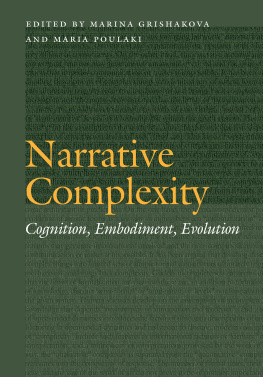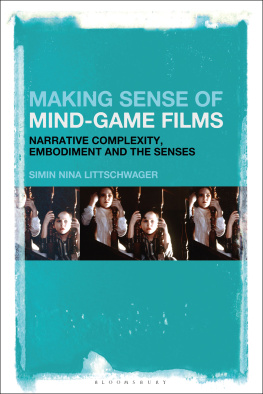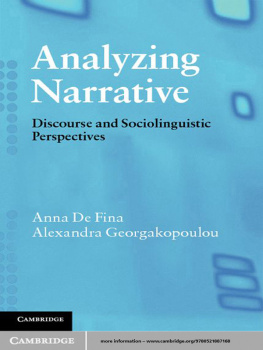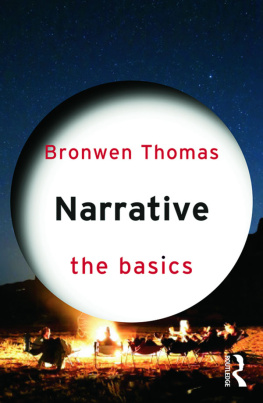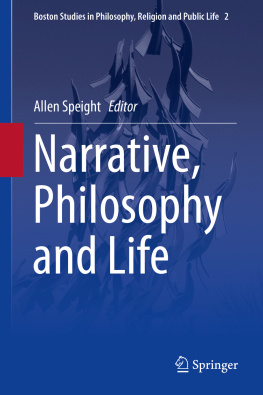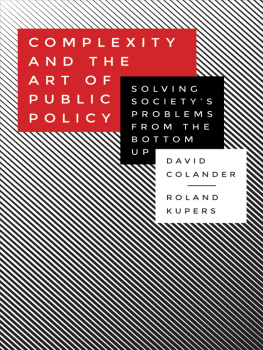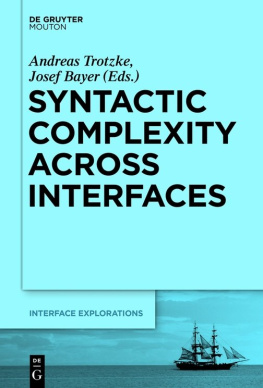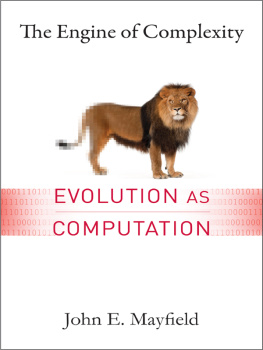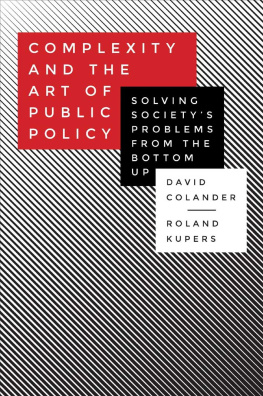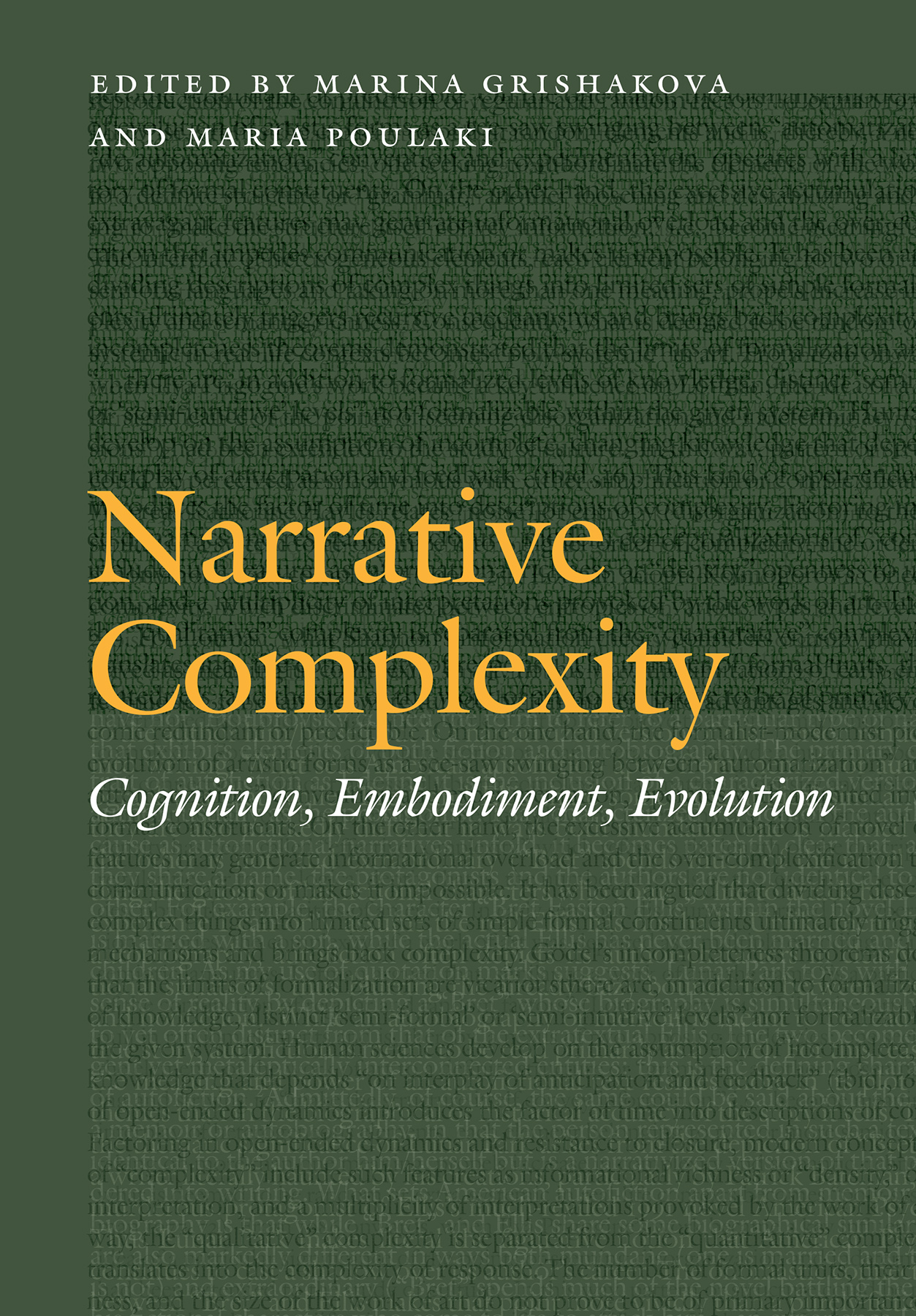
Encyclopedic in scope, Narrative Complexity surveys a dazzling variety of genres, media forms, and theories about complexity, including artistic, literary, and scientific examples. Contributions by many eminent narratologists make this an invaluable work and essential reading for anyone interested in how the conjunction of narrative and complexity can be configured and interrogated. Kudos to the editors for introducing and assembling this remarkable collection.
N. Katherine Hayles, author of Unthought: The Power of the Cognitive Nonconscious
Challenging the distinction between simplicity as primary and primordial and complexity as secondary and derived from simplicity, these far-ranging studies make the case that human cultures and minds are inherently complex. There are indeterminate and uncertain. This holds particularly true for narrative discourse, which is at the heart of culture and mind. Understanding homo narrans means understanding the human being in the world in its most complex forms. As a consequence, narrative studies have to refine their intellectual instrumentsconceptually, empirically, hermeneuticallyin the ways impressively explored in this volume.
Jens Brockmeier, professor of psychology at the American University of Paris
This volume opens a new window on the emergence of narratology within the context of complexity theory. In contrast to its phase of pluralization in the form of diverse models and paradigms, narratology, by turning to complex phenomena such as self-organization, nonlinearity, recursion, and nonhierarchical relations in various media, is exploring new domains where the interactions between embodied cognition and social and cultural embeddedness are redefining the contours of narrative. Narrative Complexity bears witness to the repositioning of the conditions of possibility of narratology.
John Pier, University of Tours and CRAL (CNRS) , Paris
Frontiers of Narrative
Series Editor
Jesse E. Matz, Kenyon College
Narrative Complexity
Cognition, Embodiment, Evolution
Edited by Marina Grishakova and Maria Poulaki
University of Nebraska Press | Lincoln
2019 by the Board of Regents of the University of Nebraska
Cover designed by University of Nebraska Press.
All rights reserved.
Publication of this volume was supported by the Estonian Research Council (grants 192, Emergent Stories: Storytelling and Joint Sensemaking in Narrative Environments, and 1481, The Role of Imaginary Narrative Scenarios in Cultural Dynamics) and the European Regional Development Fund (Center of Excellence in Estonian Studies).
Library of Congress Cataloging-in-Publication Data
Names: Grishakova, Marina, editor. | Poulaki, Maria, editor.
Title: Narrative complexity: cognition, embodiment, evolution / edited by Marina Grishakova and Maria Poulaki.
Description: Lincoln: University of Nebraska Press, [2019] | Series: Frontiers of narrative | Includes bibliographical references and index.
Identifiers: LCCN 2019001146
ISBN 9780803296862 (cloth: alk. paper)
ISBN 9781496214904 (epub)
ISBN 9781496214911 (mobi)
ISBN 9781496214928 (pdf)
Subjects: LCSH : Discourse analysis, Narrative.
Classification: LCC P 302.7 . N 3664 2019 | DDC 401/.41dc23 LC record available at https://lccn.loc.gov/2019001146
The publisher does not have any control over and does not assume any responsibility for author or third-party websites or their content.
Contents
Marina Grishakova and Maria Poulaki
Marie-Laure Ryan
David Ciccoricco and David Large
Emma Whittaker
Noam Knoller
Ulrik Ekman
Joseph P. Magliano, Karyn Higgs, and James Clinton
Neil Cohn
James E. Cutting
Hamid R. Ekbia
Mieke Bal
Ellen J. Esrock
Maria Poulaki
Pia Tikka and Mauri Kaipainen
Martin E. Rosenberg
Marina Grishakova
James Carney
Jos Angel Garca Landa
This volume would not have been possible without the invaluable input of friends and colleagues with whom we had the pleasure to share and discuss our ideas over the preceding years. We are grateful for their encouragement and support. We thank Jesse Matz, our series editor, and Alicia Christensen, our editor, for believing in our book and all staff members of the University of Nebraska Press who assisted us with editing. Our deepest gratitude to N. Katherine Hayles, Jens Brockmeier, and John Pier for reading the manuscript and providing their generous endorsement. We would also like to thank the anonymous reviewers for their advice and comments.
Narrative Complexity
Marina Grishakova and Maria Poulaki
A recent large-scale international study has shown that different societies tend eventually to evolve toward complexity. Complexity inheres in human cognition and the tools that humans use to change their social and technological environments. There is a feedback loop between the development of technologies and cultural practices, on the one hand, and the ways of conceptualizing complexity, on the other (Hayles 1990, xiv). Indeed, human cognition and action, as anthropogenic disturbances, affect environments by amplifying the range of uncertainty and complexity. Building explanatory systems to capture and explain the emergent complexity leads to an acknowledgment of the limits to and gaps in knowledge, which, in turn, prompts building ever-newer explanatory systems ad infinitum. The complexification of cognition and behavior and the complexification of society are mutually reinforcing. At the same time, Edgar Morin warns against the tendency to simplify knowledge in contemporary society, with its desire for narrow specializations, resulting in fragmentation and quantification of knowledge, a huge amount of anonymous information manipulated by media and nation-states, and a spread of simplistic ideologies. Morin argues for the need for complex thought as the basis for political strategies that could be efficient only by working with and against uncertainty, chance, the multiple play of interactions and retroactions (2008, 5).
Driven by the problems of complexity and inspired by the emerging research on complex narratives in various narratological quarters, this volume takes another step toward establishing narrative studies of complexity and explores how narrative complexity differs in terms of mind and body engagement and embeddedness in social and cultural practices. Challenging the classical distinction between simplicity as primary and prototypical and complexity as secondary and derived from simplicity, we maintain that complexity, in its various guises, is an ongoing state of human societies and human minds. This volume is an attempt to reach beyond the dichotomies of primary and secondary by introducing the complexity of homo cogitans and homo narrans behavior, as guided by intention and judgment but also as embedded in various biological, social, and cultural systems. In this way we aim at the complexification of our knowledge of both narrative representation and intelligent behavior, not by discarding current approaches but rather by striving for a new synthesis, including the interplay of agent- and system-oriented perspectives.
Formal, Systemic, and Processual Complexity
Interest in complexity has been common to the arts and sciences. The history of artistic forms of complexity, from prehistoric cultures through the baroque style and romanticism to avant-garde and postmodernism, is inextricably intertwined with philosophical, scientific, and technological developments and epistemic shifts. The formal perfection of an artistic masterpiece has long served as the epitome of complexity. From the formal, aesthetic perspective,
Next page
